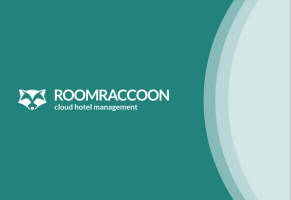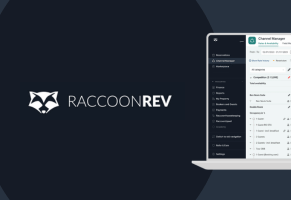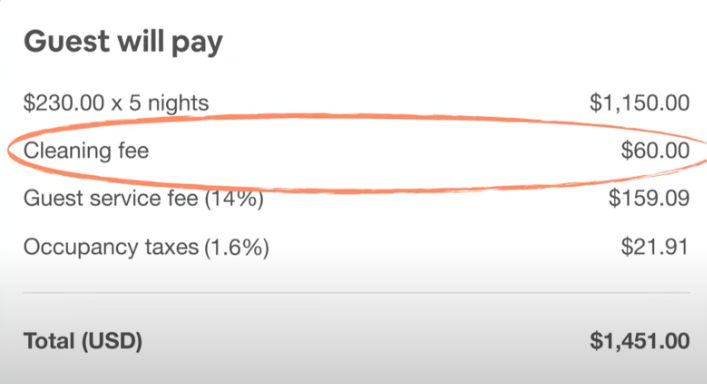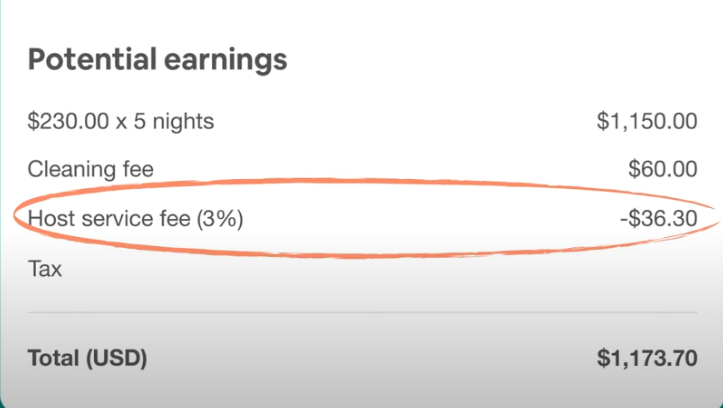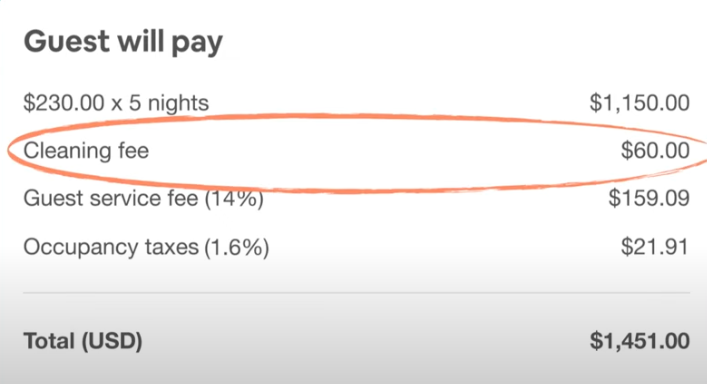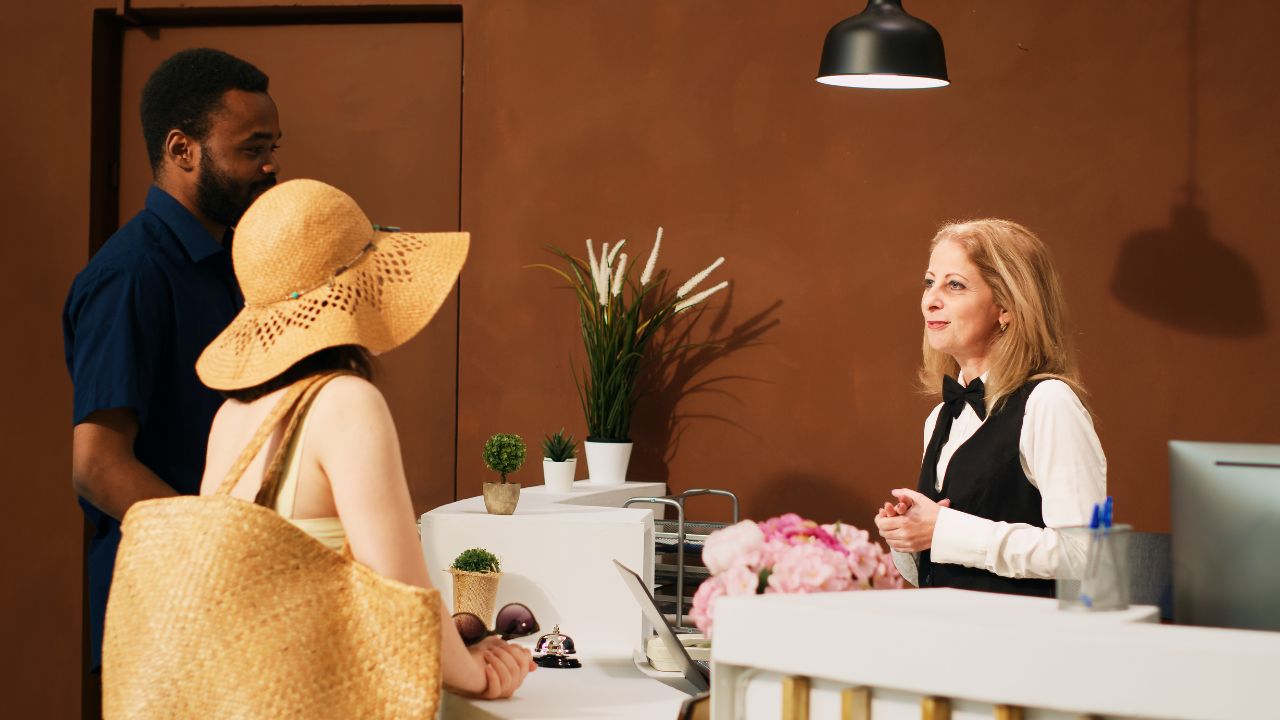CORE PRODUCT
How Much Are Airbnb Fees? A Guide for Savvy Hosts
February 29, 2024 Nicky. M
Home > Guest Experience, Marketing, Technology, Tips & Tricks, Vacation Rentals > How Much Are Airbnb Fees? A Guide for Savvy Hosts
Share this post

How Much are Airbnb Fees?
Most Airbnb hosts pay a flat service fee of 3% of their booking subtotal. The subtotal is your nightly rate plus any optional fees you charge guests, like a cleaning fee. Guest fees and taxes are not included in this amount. Guests typically pay a service fee of around 14% of the booking subtotal.
Let’s say you’re offering a rental space for $120 USD per night for a 3-night stay, and you charge a $50 USD cleaning fee. Your booking subtotal would be $410 USD. The host service fee remains at 3% of the booking subtotal ($12.30 USD), deducted from your earnings, and the service fee for guests stays at 14% ($57.40 USD), included in the total price they pay.
- You’d earn $397.70 USD.
- Your guest would pay $467.40 USD.
Airbnb’s service fees are competitive and transparent so that hosts and guests know exactly what they’re paying.
Types of Airbnb Fees
Understanding how Airbnb fees contribute to your overall pricing structure will help you gain valuable insights into optimizing your listing for success. This way, you can confidently set a competitive nightly rate that includes all fees, ensuring your total price remains competitive with other local listings.
1. Optional Fees
Hosts can generate additional income or cover the expenses incurred by guests during their stay by charging optional fees. These fees are entirely at the discretion of the hosts and are usually one-time charges. Optional fees may include additional guests, pet fees, cleaning fees, or a late check-out fee.
2. Service Fees
There are two different Airbnb service fees: split fee and host-only fee.
Service fees aim to maintain the Airbnb platform, provide 24/7 community support, and ensure everything runs smoothly.
Split-Fee
The split-fee structure is common among smaller hosts with non-traditional listings like a house rental. This fee structure works by dividing the service’s total cost between the host and the guest. Host service fees are usually charged at 3%, but some hosts may pay more, especially those with listings in Italy. This fee is deducted from the host payout.
Guests are charged a service fee of around 14.2%. This fee is added to the price set by the host and displayed to guests in the price breakdown.
However, starting from April 2024, guests who book in a different currency than the host’s will be charged an additional service fee. As a result, the guest service fee for cross-currency bookings may be up to 16.5% of the booking subtotal.
Host-only Fee
With this structure, the entire fee is deducted from the host payout. It’s typically 14–16%, though hosts with Super Strict cancellation policies may pay more, and fees for stays of 28 nights or more may be less.
The host-only fee is mandatory for traditional listings such as hotels, serviced apartments, hostels, and software-connected hosts with Airbnb channel manager connections.
3. VAT Charges
VAT is applicable on both guest and host service fees for a reservation. In case there is any change in the service fee due to reservation modification, VAT is adjusted accordingly.
Based on the country of residence or the location of the listing, hosts may be required to collect VAT or other taxes, such as occupancy taxes, on the accommodation and/or experience services offered to guests.
Strategies for Managing Airbnb Fees
Balancing Airbnb fees, competitive pricing, and profitability can be a challenge. Discover the top three strategies to help you find the ideal balance:
1. Consider all expenses when determining your base rate
Before setting your prices, understand all the costs of running your property. This includes Airbnb fees, cleaning costs, maintenance costs, and any other expenses. This will help you set a price that covers your costs and leaves room for profit.
For instance, if you set your nightly rate for your property at $150. However, if you realize that Airbnb charges a 10% service fee for each booking, amounting to $15 per night, you must adjust your pricing strategy accordingly.
To maintain your desired profit margin, you may need to increase your base rate to $165 per night to accommodate the additional fees imposed by the platform.
2. Generate revenue from additional sources
Airbnb fees are based on nightly rates and any extra fees you charge for things like housekeeping and pets. But you are not limited to only offering your guests add-ons through Airbnb.
By working with a hotel management system like RoomRaccoon, you can own the pre-arrival experience with a fully integrated digital guest service menu and charge for add-ons that won’t have the Airbnb slice taken out of it. Think airport transport, breakfast, bicycle rental, and equipment hire.
3. Don’t be afraid to play with dynamic rates
The fees that Airbnb charges throughout the year are mostly constant, but seasonality means that pricing should constantly be changing to meet demand and maximize profit.
Lowering prices during a slow season can attract more sales and create repeat customers. This can pay off in the long run, especially during high-demand months. By establishing a loyal customer base, you can increase revenue and overall success.
But what should you do in case of a sudden increase in Airbnb demand due to a Taylor Swift concert in your area? Manually updating your rates is time-consuming or may already be too late, which is why RoomRaccoon has a dedicated Yield Manager so hotel partners can implement yield rules that consider fluctuations in demand and automatically optimise your rates on Airbnb and across other channels.
Beyond Airbnb: Exploring Alternatives to Host Fees
Airbnb used to dominate the home rental space, but nowadays, guests look beyond it to alternative options with comparable features and lower commissions. Even the slightest changes in Airbnb fees can impact your bottom line. That’s why it’s wise to be ready, whether that means bumping up your base price or diversifying your distribution strategy to include a variety of channels.
At the same time, Airbnb can also alter its search algorithm, meaning your listing might not show up as much. Less visibility means fewer bookings, so you have to cast the net wide to maintain a steady flow of business.
Here are three ways to mix things up and get more bookings without being too reliant on Airbnb.
1. Get listed on other channels
A multitude of diverse booking platforms exist, offering the potential to showcase your listing to a vast and diverse audience of potential guests. For example, you could list your properties on Vrbo, Booking.com, Expedia, Tripadvisor, or Agoda.
Among these options, Vrbo (Vacation Rentals By Owner) stands out as a notable competitor to Airbnb. Vrbo offers a wide range of distinctive properties and transparent pricing, making it a top alternative for those seeking a genuine home away from home.
Creating an account and listing your property on multiple websites is just the beginning. To ensure a seamless booking experience, it’s essential to connect your accounts and calendars. Oversights in this area can lead to inconsistencies in availability. For instance, while a potential guest may see your rental as available on one platform, it could already be booked through another channel.
Learn how you can avoid this below.
2. Use a channel manager to prevent double bookings
A channel manager is essential for property managers and owners promoting their listings on multiple websites. The tool syncs your listings, calendars, and availability across all the channels you advertise on so you can keep them up-to-date.
Channel managers allow you to:
- Prevent double bookings: Avoid two guests booking your rental for the same time period on two different booking sites. Sorting out double bookings is expensive and a real hassle to deal with.
- Save time on managing your listings, calendars, and availability.
- Make single or bulk rate updates to all channels simultaneously.
The RoomRaccoon channel manager has direct two-way API connections with Airbnb, Booking.com, Vrbo and many other booking channels. This allows you to:
- Manage your listings on both channels from one place
- Sync your calendars and availability in real time and
- Use integrated dynamic pricing tools to update your rates based on demand
3. Take direct bookings on your website
The ultimate step to breaking free from reliance on platforms such as Airbnb is to establish your own website for direct bookings. Picture this: no more hefty commissions eating into your profits, no more relinquishing control over your marketing strategies. With direct bookings, every penny saved is a penny earned, empowering you to reinvest in your property and elevate guest experiences.
A beautiful property website integrated with a booking engine is a powerful combo to drive bookings, especially for travellers looking for a better rate or wanting more information before they book.
RoomRaccoon’s integrated booking engine harmonizes seamlessly with the channel manager, amplifying your presence across booking channels while preserving the advantage of commission-free bookings. Noteworthy booking engine features:
- A price comparison widget that shows your pricier Airbnb rates so potential guests know they are getting a better direct booking rate.
- A user-friendly 5-step booking process with advanced search options for both adults and children. The easier the booking process, the more likely the guest will complete it.
- Bookable add-ons and upsells to provide added value to guests and increase your TrevPAR.
- Attract more international guests with a currency and language switcher, including discount codes.
Manage Your Airbnb Fees and Rates With RoomRaccoon
When Airbnb fees go up, it’s a smart move to bump up your base rates too. With a one-stop property management solution like RoomRacoon, you’ve got everything covered. You can easily manage all your rates, whether they’re direct or specific to different channels, all while taking those third-party fees into account.
With our extensive Marketplace, you can effortlessly showcase your property on the most popular channels, including Airbnb, Vrbo, Booking.com, and Expedia, all in one place. This means you can multiply your reach and maximize your bookings without the hassle of managing multiple accounts. Sign up now and watch your booking rate soar!
Follow us
Nicky. M
Nicky is RoomRaccoon's Senior Content Manager, combining a love for travel with a practical approach to improving hotel performance through tech and insightful tips. Join her journey where travel, hospitality, and technology meet.
Related Posts
Subscribe to our newsletter for more on the latest hospitality & RoomRaccoon updates delivered straight to your inbox!
